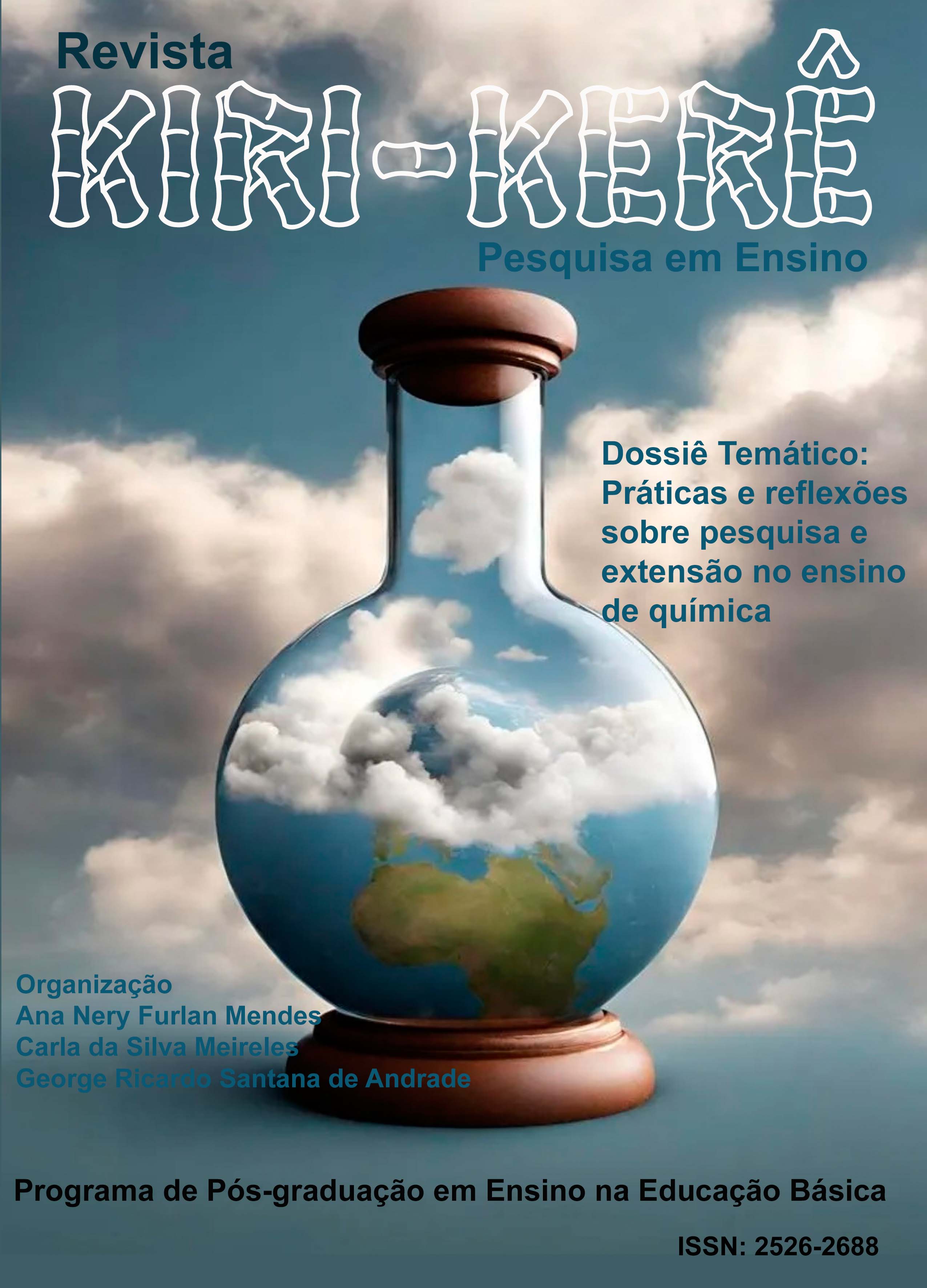Didactic proposal for teaching the periodic table for 9th year elementary school students
DOI:
https://doi.org/10.47456/krkr.v1i17.44495Keywords:
Didactic games; Chemistry teaching; Alternative methodologies; Basic EducationAbstract
Pedagogical games in chemistry education can help and facilitate learning, as they enable various ways of working in the classroom. Because they are a collective activity, they encourage interaction between students, which allows for moments of discussion and resolving doubts. A game entitled "Getting the chemical element right" was therefore developed, aimed at teaching the periodic table, with the aim of making the study of this content more attractive and useful for both the teacher and the elementary school student. The Design Thinking methodology was used to build the game and, after its development, it was applied to 17 students in the 9th year of primary school at a municipal school in Linhares-ES. The practice was carried out in four stages: 1st - a theoretical lesson (given in previous lessons by the teacher without the researcher being present); 2nd - a discussion with the students about the importance and usefulness of chemical elements in everyday life; 3rd - an explanation of the rules and division of the groups; 4th - application and evaluation of the game. The results showed that the game "Getting the element right" is an ally in the process of teaching the Periodic Table and provides meaningful learning, creating an atmosphere of relaxation and interaction between the students, making it a possible motivator for teaching chemistry.
Downloads
References
BARROS, M. C. F. B.; MIRANDA, J. C.; COSTA, R. C. Uso de jogos didáticos no processo ensino-aprendizagem. Revista Educação Pública, Rio de Janeiro, quadriênio 2017-2020. Disponível em: https://educacaopublica.cecierj.edu.br/artigos/19/23/uso-de-jogos-didaticos-no-processo-ensino-aprendizagem. Acesso em: 28 fev. 2024.
BRASIL. Ministério da Educação. Base Nacional Comum Curricular. Brasília, 2018. Disponível em: http://basenacionalcomum.mec.gov.br/images/BNCC_EI_EF_110518_versaofinal_site.pdf. Acesso em: 07 set. 2023.
GONZAGA, G. R et al. Jogos didáticos para o ensino de Ciências. Revista Educação Pública, Rio de Janeiro, quadriênio 2017-2020. Disponível em: https://educacaopublica.cecierj.edu.br/artigos/17/7/jogos-didticos-para-o-ensino-de-cincias. Acesso em: 28 fev. 2024.
KISHIMOTO, T. M. Jogo, brinquedo, brincadeira e a educação. São Paulo: Cortez, 2003.
MARCONI, M. A; LAKATOS, E. M. Fundamentos da Metodologia Científica. 5 ed. São Paulo: Atlas, 2003.
MENDES, C. F.; BRAGA, N. M. P.; SOUSA, M. A. N. Jogo didático-ecológico aplicado a alunos do quinto ciclo: conhecendo a nossa fauna. Anais do VIII Congresso de Ecologia do Brasil. l, Caxambu- MG, 23 a 28 de setembro de 2007. Disponível em: https://www.seb-ecologia.org.br/revistas/indexar/anais/viiiceb/pdf/1023.pdf. Acesso em: 10 jan. 2024.
MOREIRA, M. A. Subsídios Teóricos para o Professor Pesquisador em Ensino de Ciências: a teoria da aprendizagem significativa. Porto Alegre: UFRGS, 2009.
PRODANOV, C. C.; FREITAS, E. C. de. Metodologia do trabalho científico: métodos e técnicas da pesquisa e do trabalho acadêmico. 2 ed. Novo Hamburgo: Feevale, 2013.
RODRIGUES, R. S. F. A importância do uso de recurso didático para o processo de ensino-aprendizagem nas aulas de biologia. Anais VII ENALIC. Realize Editora, Campina Grande, 2018. Disponível em: https://editorarealize.com.br/artigo/visualizar/51798. Acesso em: 24 ago. 2023.
SANTANA, E. M.; REZENDE, D. B. O Uso de Jogos no ensino e aprendizagem de Química: Uma visão dos alunos do 9º ano do ensino fundamental. Anais do XIV Encontro Nacional de Ensino de Química. Curitiba, Brasil, 2008. Disponível em: http://www.quimica.ufpr.br/eduquim/eneq2008/resumos/R0125-1.pdf. Acesso em: 15 jan. 2024.
SANTANA, E. M.; REZENDE, D. B. A Influência de Atividades Lúdicas na Aprendizagem de Conceitos Químicos. Universidade de São Paulo, Instituto de Física - Programa de Pós-Graduação São Paulo – SP, 2006. Disponível em: https://axpfep1.if.usp.br/~profis/arquivos/vienpec/CR2/p467.pdf. Acesso em: 29 fev. 2024.
SANTOS, V. R. Jogos na escola: os jogos nas aulas como ferramenta pedagógica. Petrópolis: Editora Vozes, 2014.
SPAGNOLO, C; SANTOS, B. S. dos. Design thinking na (trans) formação de professores. Caxias do Sul, RS: Educs, 2021. Disponível em: https://www.ucs.br/educs/arquivo/ebook/design-thinking-na-transformacao-de-professores/. Acesso em: 26 jan. 2024.
VYGOTSKY, L. S. A formação social da mente. São Paulo: Martins Fontes, 2007.
Downloads
Published
Issue
Section
License
Copyright (c) 2024 Thayara Vieira Tellaroli Pandolfi, Ana Nery Furlan Mendes

This work is licensed under a Creative Commons Attribution-NonCommercial 4.0 International License.
The authors accept, when sending their works, the assignment of their copyrights.

